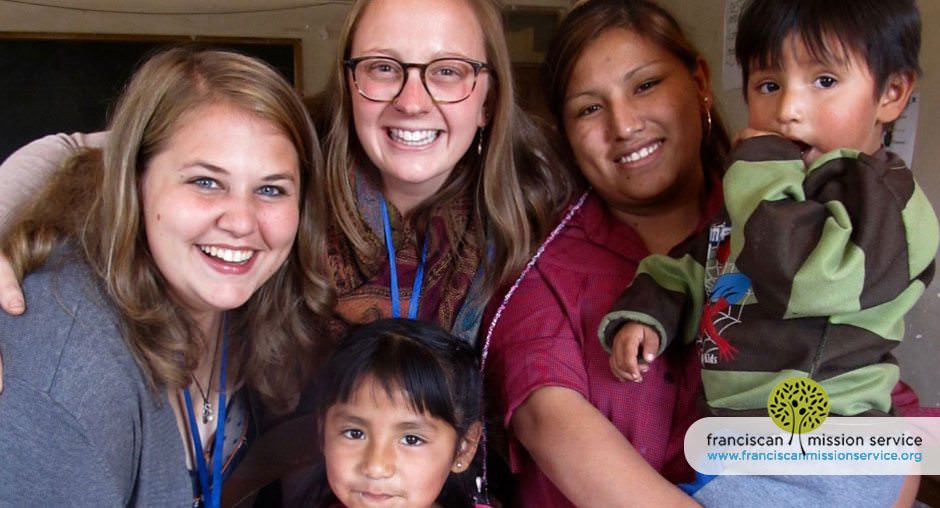A Deeper Definition of Dignity

Editor’s note: Missioner Catherine Hope Sullivan explores perspectives on sexuality through the lens of her experiences in San Sebastian Prison in Cochabamba, Bolivia.
First comes love. Then comes marriage. Then comes the baby in the baby carriage. Are you all singing along? I know I am. I have known that song for as long as I can remember. The giggles, the high-pitched group of prepubescent girls huddled together sing-whispering: it was all in good fun. And the message has stuck with me.
I heard a similar message in Church, a similar message in school, at home, in the disapproving faces and voices of adults when a young girl got “knocked-up” by her high school boyfriend. And it is a message that I continue to believe in. Now, I don’t believe in the disapproving glances, but I do believe that sex is important enough to be saved for the deepest relationship of someone’s life, and I do believe that it is a blessing to bring a child into a home where two parents love each other unconditionally, can lean on one another, and help each other to make decisions with the child’s best interests in mind.
However, there is a danger in such messages. Where there is an “ideal,” especially one that is so normalized in society that it is included in children’s nursery rhymes, there is often judgment passed on those who do not meet this ideal. And sometimes, that judgment even traverses continents.
The women I know here in Cochabamba, Bolivia, are, for the most part, unmarried and have at least one child. There are many reasons for this, including marriage costs, high divorce rates (76%), and extremely high rates of domestic violence (53% percent of Bolivian women reported experiencing physical or sexual violence at the hands of a partner). According to the marital statistics of Bolivia from the year 1990 to the year 2007, the number of legal marriages in Bolivia dropped from 40,322 to only 18,072 (with only 334 recorded in Cochabamba that year).
However, the idea that “first comes marriage” is an ideal verbalized by many Bolivian people, especially those in the upper class, or in positions of power. As a matter of fact, there are many groups that come to preach the teachings of the Bible inside the prison, and this lesson often comes with them—and with it, unfortunately, a sense of shame upon those who walked on a different path (almost all of the women).
Just last week, I was sitting in on a class in the prison with about 20 of my friends who had signed up as students, and the presenter, an upper-class Bolivian woman who is an Evangelical Social Worker, talked for over an hour about how sex within a marriage is the most beautiful (a sentiment that I happen to agree with) and that those who have sex outside of marriage will be forever, irrevocably damaged and scarred (a sentiment that I disagree with and find very problematic).
The presenter passed an apple around the room, and had each woman take a bite. Then, the presenter put that apple next to an apple that was still untouched. The presenter asked which apple was more beautiful. Which apple was more appealing? Which apple was more pure? The presenter compared the apples to women and their sexuality. The problem is not the untouched apple; the problem is saying that the untouched apple is somehow more worthy of love, human dignity, and acceptance—and in the eyes of God, no less.
Immediately following this fruit(less) presentation, the presenter asked the students which of them was married. Not a single woman raised her hand. Next, a little surprised, the presenter asked which of the women had a significant other. This time, one young woman raised her hand. The presenter seemed taken aback. The next question was, “How many of you have children?” Every single woman in the room (except for me) raised her hand. The presenter’s entire lesson was condemning the very women who were sitting in that room. Sadly, this is a very common occurrence.
In living in Bolivia, in experiencing a new culture that has a very different and beautiful set of traditions and history and yet is often subjected to the ideals and expectations of the Western world, I have seen first-hand how such ideals, that may have started out as something pure and beautiful, can be twisted and corrupted in condemnation and judgment of others.
These are strong and beautiful women, loving and giving mothers, who see their children often as the greatest blessings of their lives–as representations of goodness, redemption, and faith in their often difficult experiences. To have so many people telling them that their children are mistakes, sins, darknesses of their pasts, is to misunderstand the dignity and strength of each of these women. Over time, I have come to know these women, to know many of their children, and to see how each one is a blessing, a gift, and a grace.
Perhaps what we are called to bring with us as foreigners, is not an “ideal,” riddled with consequences, but rather an openness to a wider definition of human dignity and worth, that can only be understood through real encounter and friendship.
Reflection question: How can you open your heart to others’ worth?
Tagged in:

